The Lamentations of Jeremiah
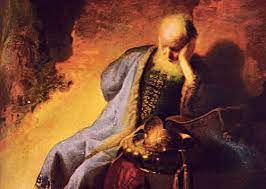

Lamentations is recited annually by Jews on the fast day of Tisha B'Av ("Ninth of Av") (July–August),
mourning the destruction of both the First Temple (by the Babylonians in 586 BCE)
and the Second Temple (by the Romans in 70 CE).
In Christian tradition, readings from Lamentations are part of the Holy Week liturgies.
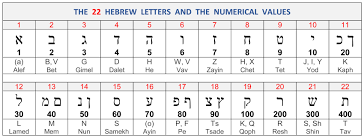
The first four chapters are written as acrostics. Chapters 1, 2, and 4 each have 22 verses, corresponding to the 22 letters of the Hebrew alphabet, the first lines beginning with the first letter of the alphabet, the second with the second letter, and so on. Chapter 3 has 66 verses, so that each letter begins three lines. Unlike standard alphabetical order, in the middle chapters of Lamentations, the letter pe the 17th letter) comes before (the 16th). In the first chapter, the Masoretic text uses the standard/modern alphabetical order; however, in the dead sea scroll version of the text, c. 37 BCE – 73 CE), even the first chapter uses order found in chapters 2, 3, and 4... Given that they largely abandoned the Paleo-Hebrew script for the Aramaic script (which used ayin-pe), it is not surprising that they also adopted the Aramaic letter order (around the same (exilic) time period). The fact that Lamentations follows the pre-exilic pe-ayin order is evidence for the position that they are not postexilic compositions but rather written shortly after the events described. The fifth poem, corresponding to the fifth chapter, is not acrostic but still has 22 lines. (Wikipedia)
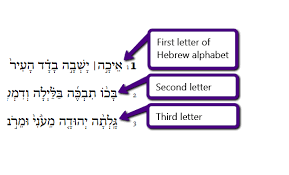
![]()
Zedekiah was twenty-one years old when he began to reign; he reigned for eleven years in Jerusalem. His mother’s name was Hamutal daughter of Jeremiah of Libnah. He did what was evil in the sight of the Lord, just as Jehoiakim had done. Indeed, Jerusalem and Judah so angered the Lord that he expelled them from his presence.
Zedekiah rebelled against the king of Babylon. And in the ninth year of his reign, in the tenth month, on the tenth day of the month, King Nebuchadrezzar of Babylon came with all his army against Jerusalem, and they laid siege to it; they built siege-works against it all round. So the city was besieged until the eleventh year of King Zedekiah. On the ninth day of the fourth month the famine became so severe in the city that there was no food for the people of the land. Then a breach was made in the city wall; and all the soldiers fled and went out from the city by night by the way of the gate between the two walls, by the king’s garden, though the Chaldeans were all round the city. They went in the direction of the Arabah. But the army of the Chaldeans pursued the king, and overtook Zedekiah in the plains of Jericho; and all his army was scattered, deserting him. Then they captured the king, and brought him up to the king of Babylon at Riblah in the land of Hamath, and he passed sentence on him. The king of Babylon killed the sons of Zedekiah before his eyes, and also killed all the officers of Judah at Riblah. He put out the eyes of Zedekiah, and bound him in fetters, and the king of Babylon took him to Babylon, and put him in prison until the day of his death.
In the fifth month, on the tenth day of the month—which was the nineteenth year of King Nebuchadrezzar, king of Babylon—Nebuzaradan the captain of the bodyguard who served the king of Babylon, entered Jerusalem. He burned the house of the Lord, the king’s house, and all the houses of Jerusalem; every great house he burned down. All the army of the Chaldeans, who were with the captain of the guard, broke down all the walls around Jerusalem. Nebuzaradan the captain of the guard carried into exile some of the poorest of the people and the rest of the people who were left in the city and the deserters who had defected to the king of Babylon, together with the rest of the artisans. But Nebuzaradan the captain of the guard left some of the poorest people of the land to be vine-dressers and tillers of the soil.
The pillars of bronze that were in the house of the Lord, and the stands and the bronze sea that were in the house of the Lord, the Chaldeans broke in pieces, and carried all the bronze to Babylon. They took away the pots, the shovels, the snuffers, the basins, the ladles, and all the vessels of bronze used in the temple service. The captain of the guard took away the small bowls also, the firepans, the basins, the pots, the lampstands, the ladles, and the bowls for libation, both those of gold and those of silver. As for the two pillars, the one sea, the twelve bronze bulls that were under the sea, and the stands, which King Solomon had made for the house of the Lord, the bronze of all these vessels was beyond weighing. As for the pillars, the height of one pillar was eighteen cubits, its circumference was twelve cubits; it was hollow and its thickness was four fingers. Upon it was a capital of bronze; the height of the capital was five cubits; lattice-work and pomegranates, all of bronze, encircled the top of the capital. And the second pillar had the same, with pomegranates. There were ninety-six pomegranates on the sides; all the pomegranates encircling the lattice-work numbered one hundred.
The captain of the guard took the chief priest Seraiah, the second priest Zephaniah, and the three guardians of the threshold; and from the city he took an officer who had been in command of the soldiers, and seven men of the king’s council who were found in the city; the secretary of the commander of the army who mustered the people of the land; and sixty men of the people of the land who were found inside the city. Then Nebuzaradan the captain of the guard took them, and brought them to the king of Babylon at Riblah. And the king of Babylon struck them down, and put them to death at Riblah in the land of Hamath. So Judah went into exile out of its land.
This is the number of the people whom Nebuchadrezzar took into exile: in the seventh year, three thousand and twenty-three Judeans; in the eighteenth year of Nebuchadrezzar he took into exile from Jerusalem eight hundred and thirty-two persons; in the twenty-third year of Nebuchadrezzar, Nebuzaradan the captain of the guard took into exile of the Judeans seven hundred and forty-five persons; all the people were four thousand six hundred.
In the thirty-seventh year of the exile of King Jehoiachin of Judah, in the twelfth month, on the twenty-fifth day of the month, King Evil-merodach of Babylon, in the year he began to reign, showed favour to King Jehoiachin of Judah and brought him out of prison; he spoke kindly to him, and gave him a seat above the seats of the other kings who were with him in Babylon. So Jehoiachin put aside his prison clothes, and every day of his life he dined regularly at the king’s table. For his allowance, a regular daily allowance was given him by the king of Babylon, as long as he lived, up to the day of his death. (Jeremiah 52)
The Third King of Israel was Solomon. It was he who built the First Jewish Temple. It was an immense undertaking over seven years. Completed in 953 BC that building was one of the wonders of the ancient world for 367 years. Destroyed on the 9th of Av 586 BC, that event is what motivated Jeremiah to write Lamentations. The population of Jerusalem was probably over a million people at the time. The city was under siege for two years with most able bodied perishing on the ramparts.
The Temple of Solomon was one of the wonders of the ancient world. The wealth of the temple was astonishing---100,000 talents of gold and 1,000,000 talents of silver. (A talent weighted 75 pounds), From his own private fortune David also gave 3,000 talents of gold and 7,000 talents of high grade silver. This is an enormous quantity of gold and silver by any standard: 100,000 talents of gold = 3750 tons, value today = $45 billion; 1,000,000 talents of silver = 37,500 tons, value today = $10.8 billion.
In round numbers, the wealth of the first temple was about $56 billion. 3750 tons equals 12 x 2000 x 3750 ounces at $1800 per ounce = $160 billion today.
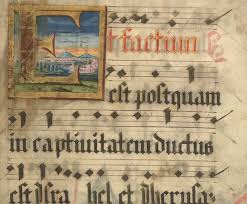
Please read through the entire Lament. This will take about thirty minutes.
Note that in Chapter One, Jerusalem is pictured as a lonely widow. The men of Jerusalem have all been killed on the ramparts. The great wonder of the ancient word, Solomon's Temple has been pulled down, the gold and temple treasures carted off to Babylon and placed in pagan temples. Levitical priests serving in the temple have been slain. Dead bodies lie unburied in the streets. This widow bereaved of her husband is not a virtuous woman; she has had many lovers. In this lament there is grief and sorrow but no turning to God. Jeremiah also describes the surviving men and starving children--the final siege of Jerusalem lasted two years. History records women killing, boiling, and eating their own children just to stay alive longer. Foreign observers were appalled. Seventy years of desolation would pass before small numbers off Jews were allowed to return and rebuild (See Ezra, Nehemiah, and Esther).
In Chapters Two through Four, Jeremiah tells us of his personal grief, the chastening he received from the Lord.
He also has been tested severely. Even his close friends have died. He was not allowed to marry 50 years earlier; his sole companion has been God. His own relatives in Anatoth turned against him. He is no different from his fellow Jews except that he knows God. Finally, his own surviving countrymen hauled him to Egypt against his will, where he was martyred. It's not difficult see in this Lament the loss of national identity, purpose, aspirations when God strikes down a people. Yet, God suffers more than His people.
Don't miss the great breakthrough in Chapter 3 which brings us all hope:
22 The steadfast love of the Lord never ceases,
his mercies never come to an end;
23 they are new every morning;
great is your faithfulness.
24 ‘The Lord is my portion,’ says my soul,
‘therefore I will hope in him.’
25 The Lord is good to those who wait for him,
to the soul that seeks him.
26 It is good that one should wait quietly
for the salvation of the Lord.
27 It is good for one to bear
the yoke in youth,
28 to sit alone in silence
when the Lord has imposed it,
29 to put one’s mouth to the dust
(there may yet be hope),
30 to give one’s cheek to the smiter,
and be filled with insults.
31 For the Lord will not
reject for ever.
32 Although he causes grief, he will have compassion
according to the abundance of his steadfast love;
33 for he does not willingly afflict
or grieve anyone.
34 When all the prisoners of the land
are crushed under foot,
35 when human rights are perverted
in the presence of the Most High,
36 when one’s case is subverted
—does the Lord not see it?
37 Who can command and have it done,
if the Lord has not ordained it?
38 Is it not from the mouth of the Most High
that good and bad come?
39 Why should any who draw breath complain
about the punishment of their sins?
40 Let us test and examine our ways,
and return to the Lord.
41 Let us lift up our hearts as well as our hands
to God in heaven.
42 We have transgressed and rebelled,
and you have not forgiven.
Lamentations closes with a prayer:
5:19 But you, O Lord, reign for ever;
your throne endures to all generations.
20 Why have you forgotten us completely?
Why have you forsaken us these many days?
21 Restore us to yourself, O Lord, that we may be restored;
renew our days as of old—
22 unless you have utterly rejected us,
and are angry with us beyond measure.
Lamentations is about the death of a nation. Any nation! Yet Israel is a chosen people, a favored, privileged people. They are the only nation with a covenant relationship to Yahweh. Six hundred fifteen years later a greater prophet, Jesus, wept over Jerusalem knowing that forty years later the Second Jewish Temple would be destroyed, again with horrendous loss of life. The imminent fall of our nation ought not to surprise us! Therefore Lamentations is our Lament.

![]()
As you read through this book, you will find many foreshadowing of our Lord weeping over the city of Jerusalem. In the Lord's last week, when he went up to the Mount of Olives and sat looking out over the city, he wept over it saying,
"O, Jerusalem, Jerusalem, killing the prophets and stoning those who are sent to you! How often would I have gathered your children together as a hen gathers her brood under her wings, and you would not!" (Matthew 23:37 RSV)
The tears ran down his face as he looked out over the city that had rejected him; this people that did not know the hour of their visitation, and had turned their backs upon the one who was their Messiah and their deliverer.
You will also find several foreshadowings of our Lord's ministry in the book of Jeremiah's Lamentations. For example, chapter 1:
How lonely sits the city that was full of people!
How like a widow has she become, (Lamentations 1:1a RSV)
This is highly suggestive of our Lord's weeping over the city. Farther on we read:
"Is it nothing to you, all you who pass by?
Look and see if there is any sorrow like my sorrow..." (Lamentations 1:12a RSV)
This would certainly bring to the believing heart an immediate remembrance of the cross and those who watched the Lord as he hung there on it. Then in chapter 2, verse 15:
All who pass along the way
clap their hands at you;
they hiss and wag their heads
at the daughter of Jerusalem; (Lamentations 2:15a RSV)
This recalls the mockery of the multitudes at the cross. Then in chapter 3, verses 14 and 15:
I have become the laughingstock of all peoples,
the burden of their songs all day long.
He filled me with bitterness,
he has sated me with wormwood. (Lamentations 3:14-15 RSV)
Again in verse 19 of chapter 3:
Remember my affliction and my bitterness,
the wormwood and the gall! (Lamentations 3:19 RSV)
And verse 30 of that chapter:
Let him give his cheek to the smiter... (Lamentations 3:30a RSV)
This recalls Isaiah's prophecy, "I gave my back to the smiters, and my cheeks to those who pulled out the beard." (Isaiah 50:6) This was fulfilled by the smiting of the Lord by the soldiers when Jesus was brought before Pilate for judgment. So this little book captures the agony and sorrow that was so much a part of our Lord's ministry at the cross that it earned him the title, "A man of sorrows, and acquainted with grief." (Isaiah 53:3)
 The book of Lamentations is also unusual in the way it is put together. There are twenty-two letters in the Hebrew alphabet, which begins with "aleph," the equivalent of our "a," and ends with "tau" which is the equivalent of our "t." (The letter "z," by the way, comes around the middle of their alphabet.) In this book of Jeremiah's Lamentations, chapters one, two and four form an acrostic, each chapter consisting of twenty-two verses, and each verse beginning with one of each of the letters of the Hebrew alphabet, beginning with aleph and ending with tau. Chapter three is interesting in that it consists of sixty-six verses in triads, or triplets, in which every verse making up each triad begins with the same letter of the alphabet, so that there are twenty-two groups of three altogether, one for each letter of the alphabet. These chapters have been written very, very carefully, according to the rules of Hebrew poetry. Chapter five does not follow this acrostic plan, although it does have twenty-two verses.
The book of Lamentations is also unusual in the way it is put together. There are twenty-two letters in the Hebrew alphabet, which begins with "aleph," the equivalent of our "a," and ends with "tau" which is the equivalent of our "t." (The letter "z," by the way, comes around the middle of their alphabet.) In this book of Jeremiah's Lamentations, chapters one, two and four form an acrostic, each chapter consisting of twenty-two verses, and each verse beginning with one of each of the letters of the Hebrew alphabet, beginning with aleph and ending with tau. Chapter three is interesting in that it consists of sixty-six verses in triads, or triplets, in which every verse making up each triad begins with the same letter of the alphabet, so that there are twenty-two groups of three altogether, one for each letter of the alphabet. These chapters have been written very, very carefully, according to the rules of Hebrew poetry. Chapter five does not follow this acrostic plan, although it does have twenty-two verses.
This is certainly an intriguing structure, but the real interest of this book is in its content. It is a study in sorrow, a hymn of heartbreak. This is the kind of book you might read when sorrow strikes your own heart, and sorrow comes to all of us at times. As Jeremiah was looking out over Jerusalem, he saw its desolation and he remembered the terrible, bloody battle in which Nebuchadnezzar had taken the city and sacked it, destroying the temple and killing the inhabitants.
Each chapter stresses and develops a particular aspect of sorrow. Chapter one gives us a description of the utter depths of sorrow, the desolation of spirit that sorrow makes upon the human heart, the sense of abandonment, of complete loneliness. Here you can see how vividly the prophet has captured this feeling as he pours out the feelings of his own heart. The people have been vanquished and taken into captivity; the city has been set on fire and totally destroyed. Verse 16:
"For these things I weep;
my eyes flow with tears;
for a comforter is far from me,
one to revive my courage;
my children are desolate,
for the enemy has prevailed." (Lamentations 1:16 RSV)
Chapter 2 describes the thoroughness of judgment. At the beginning of this chapter you have a description of how the armies of Nebuchadnezzar utterly devastated the city. Jeremiah, however, does not attribute this destruction to the armies of Nebuchadnezzar, but to the Lord. He looks behind the immediate circumstance to what God is doing. As you read through the chapter you can see how he points out that everything has been destroyed, nothing is left. There is nothing he can put his hand on that has been preserved because of the thorough judgment of God.
Then in chapter 3 -- this long chapter of 66 verses where you have the triads of the alphabet -- the prophet speaks of his own reaction, his personal pain as an individual contemplating this devastation. He begins with these words:
I am the man who has seen affliction
under the rod of his wrath;
he has driven and brought me
into darkness without any light;
surely against me he turns his hand
again and again the whole day long.
He has made my flesh and my skin waste away,
and broken my bones;
he has besieged and enveloped me
with bitterness and tribulation;
he has made me dwell in darkness
like the dead of long ago. (Lamentations 3:1-6 RSV)
In chapter 4 you have what we might call the incredibility of judgment, an attitude of unbelief as the prophet remembers all that happened. Anyone who has been through this knows about these aspects of the times of grief. First, there is a sense of utter desolation. Then comes an awareness of complete devastation and deep personal pain, and then, as Jeremiah seems to feel, a kind of unbelief that this could happen, a sense of incredulity as he contemplates the destruction of Jerusalem. Verse 2:
The precious sons of Zion,
worth their weight in fine gold,
how they are reckoned as earthen pots,
the work of a potter's hands! (Lamentations 4:2 RSV)
As he looks out and sees the bodies of the sons of Israel -- these precious young people who have been destroyed, turning to clay and dust in the streets -- he says:
Happier were the victims of the sword
than the victims of hunger [There had been a terrible famine in the city],
who pined away, stricken
by want of the fruits of the field. (Lamentations 4:9 RSV)
And so devastating had this siege been that,
The hands of compassionate women
have boiled their own children;
they became their food
in the destruction of the daughter of my people. (Lamentations 4:10 RSV)
This was of the most terrible sieges of all time. As the report went out, it was unbelievable (verse 12):
The kings of the earth did not believe,
or any of the inhabitants of the world,
that foe or enemy could enter
the gates of Jerusalem. (Lamentations 4:12 RSV)
In chapter 5 there is the utter humiliation of judgment, the feeling that Jeremiah has been thoroughly disgraced. He hardly dares lift up his head again. He says (verses 1-5):
Remember, O Lord, what has befallen us;
behold, and see our disgrace!
Our inheritance has been turned over to strangers,
our homes to aliens.
We have become orphans, fatherless;
our mothers are like widows.
We must pay for the water we drink,
the wood we get must be bought.
With a yoke on our necks we are hard driven;
we are weary, we are given no rest. (Lamentations 5:1-5 RSV)
He describes how in verse 13:
Young men are compelled to grind at the mill;
and boys stagger under loads of wood
The old men have quit the city gate,
the young men their music...
The joy of our hearts has ceased
The crown has fallen from our head;
woe to us, for we have sinned! (Lamentations 5:13-16 RSV)
What a description of the utter despair of the human spirit in the grip of deep distress and sorrow! And yet, in each of these chapters an insight is revealed, a lesson that God teaches through sorrow that otherwise would never have been learned. That is what we should look for in this book.
The book is designed to teach us through what might be called the therapy of trouble, what sorrow teaches us. All through scripture we are told that pain and suffering are God's instruments by which he teaches us. Through suffering comes strength of character. Do not be surprised that this is true. We read in Hebrews of the Lord Jesus, "Although he was a Son, he learned obedience through what he suffered." (Hebrews 5:8) There were things the Lord Jesus had to learn and could learn only by living as a man through times of suffering and sorrow. If he was not exempt, why should we expect to be?
This is why it is never right for a Christian to say, as so many of us do, when trouble strikes, "Why should this happen to me?" Well, why shouldn't it happen to you? As Hebrews 12, verse 10, reminds us, it is a mark of God's love. He sent it to discipline us, to teach us, and to train us.
Each chapter also reveals one particular aspect of sorrow as teaching one particular lesson of grace. In chapter 1 there is the sense of desolation and abandonment in spirit, when suddenly the prophet says in verse 18:
"The Lord is in the right, for I have rebelled against his word;" (Lamentations 1:18a RSV)
While he was looking out over Jerusalem and feeling this awful sense of desolation, he suddenly realized that this was a sign that God is right. So he says, "I have rebelled against his word."
That is the problem, and the lesson. Most of us are in the habit of blaming God, either directly or indirectly, for whatever happens to us, and our attitude is usually, "Well, I don't know why this should happen to me! After all, I have been doing my best. I have been trying hard, and still these kinds of things happen." And our implication is that God is unjust, God is not right.
The apostle Paul says, "Let God be true though every man be false." (Romans 3:4) It is impossible for God not to be right. It is impossible for man to be more just than God, because our very sense of justice is derived from him. It is impossible for man to be more compassionate than God, for our feelings of compassion come from him. You see, it is impossible for us ever to sit in judgment on God. God is right. When Jeremiah saw the utter desolation around him he learned this. As long as he had anything to prop himself up with, he could find fault with God, but when he was left utterly desolate he realized that the Lord was right.
In chapter 2 he gains more insight into this truth. He is made aware of the thoroughness of judgment, of how meticulously God has used the armies of Nebuchadnezzar to lay everything to waste In fact, how ruthless the Lord has been. But then he learns another insight (verse 17):
The Lord has done what he purposed,
has carried out his threat;
as he ordained long ago,
he has demolished without pity;
he has made the enemy rejoice over you,
and exalted the might of your foes. (Lamentations 2:17 RSV)
In other words, God is faithful. Suddenly Jeremiah realizes that this is consistent with the character of God. If he says he is going to do something, he will do it. Nothing can make him change. If you look back over the history of Israel you discover that in the book of Deuteronomy, God had said to Moses, "Moses, if my people walk in obedience to me and love me and follow me, I will pour unlimited blessing upon them. I will open the windows of heaven and just simply bless them until they can't stand it. But if they turn, if they go aside, I will plead with them and send prophets to them and work with them and have patience with them." (And the record is that for four hundred years, God put up with the intransigence of Israel.) But God also promised that if Israel followed after other gods, he would raise up a nation to come in and devastate the land. That is exactly what God said and that is exactly what he did.
It is interesting that Jeremiah predicted how long that captivity would last. It would last seventy years. (Jeremiah 25:11 ) Why seventy? Well, in the law God required Israel to allow the land to rest fallow every seventh year. They were not to plow the soil or use it; they were to let it rest. (This is a very practical principle of agricultural conservation.) During the sixth year, to make up for the lack of food, the Lord would bless them with a superabundance of crops so they would have enough food to carry them through that seventh year.
But Israel never obeyed that command. They continued using the land from the time they entered it. In a sense they robbed God of seventy years of rest for the land. They used it continuously for 490 years so God sent them out of it and rested the land for 70 years.
How faithful God is to his promise. The Lord is utterly faithful. There is a widespread belief that God is so loving, so tenderhearted, that he just gives in when you pressure him a little; that he won't do what he says he is going to do. But that idea has been put to rest forever by one of the greatest verses in the Bible (Romans 8:32): "He who did not spare his own Son..." Think of that. When he was made sin for us, God did not spare him. That is how unflinching God is in following through on his word. "He who did not spare his own Son but gave him up for us all..." And yet that verse ends in glory, doesn't it? "...will he not also give us all things with him?" One side of it is just as true as the other. Jeremiah learned that God is faithful by the thoroughness of judgment.
Then in chapter 3 where you read of Jeremiah's personal pain, we come to a tremendous passage. Suddenly, in the midst of a long wail, he says (verse 22-33):
The steadfast love of the Lord never ceases,
his mercies never come to an end;
they are new every morning;
great is thy faithfulness.
"The Lord is my portion," says my soul,
"therefore I will hope in him."
The Lord is good to those who wait for him,
to the soul that seeks him.
It is good that one should wait quietly
for the salvation of the Lord.
It is good for a man that he bear
the yoke in his youth.
Let him sit alone in silence
when he has laid it on him;
let him put his mouth in the dust --
there may yet be hope;
let him give his cheek to the smiter,
and be filled with insults.
For the Lord will not
cast off for ever,
but, though he cause grief, he will have compassion
according to the abundance of his steadfast love;
for he does not willingly afflict or grieve the sons of men. (Lamentations 3:22-33 RSV)
In many ways, this is one of the most beautiful passages in all the Bible. It reveals the compassion of the heart of God. Judgment, as Isaiah says, is his strange work. He does not like to do it. He does not willingly afflict or grieve the sons of men. His mercies are fresh every morning. In his own pain Jeremiah remembers this: that behind all the desolation is the work of love. God destroyed Jerusalem because it was heading the wrong way. He destroyed it so that he could restore it later, and build it up again in joy and peace and blessing. The Lord does not cast off forever; though he causes grief, he will have compassion.
At the end of chapter 4, the prophet says in verse 22:
The punishment of your iniquity,
O daughter of Zion, is accomplished,
he will keep you in exile no longer;
but your iniquity, O daughter of Edom, he will punish,
he will uncover your sins. (Lamentations 4:22 RSV)
The daughter of Zion is Israel. The daughter of Edom refers to the country bordering Israel that was always a thorn in their flesh. Edom is always used in scripture as a picture of the flesh. The Edomites were related to Israel. They were the children of Esau, who is always a picture of the flesh. The prophet is saying, "God will set a limit to the punishment of his own. He never drives them too far. He never disciplines them too harshly. There is a limit. The punishment is accomplished. He will keep them in exile no longer; but as to the flesh, it has been utterly set aside and Edom will be punished."
Chapter 5 describes the humiliation of judgment, but in the end, Jeremiah comes to another flash of insight (verse 19):
But thou, O Lord, dost reign for ever;
thy throne endures to all generations. (Lamentations 5:19 RSV)
What does this mean? Well, it means that though man may even perish in sorrow, God endures. And because God endures, the great purpose and workings of God endure. God never does anything temporarily; all that he does endures forever. Jeremiah sees that what God has taught him in his grief will have a practical use. Even if he were to die in the midst of his grief, God's purposes endure. God is simply preparing now for a work yet to come. God is not limited by time. He is eternal. His throne, his authority, endures to all generations. In practical terms, the prophet is realizing that after he has been through this time of grief, he will have learned a truth about God that will make him absolutely impervious to any other kind of test. Once he has been through this, nothing can reach him, nothing can upset him, nothing can trouble him, nothing can touch him or overthrow him. He is now ready for anything. And in God's great purpose there will be an opportunity to use that strength.
I often think of those words of our Lord recorded in the fourteenth chapter of Luke when he tells his disciples the two parables about counting the cost. One involved the man who went out to do battle and met a king coming against him with an army. Jesus said, "What man of you will do that and not sit down first and count the cost?" Or, in the other parable about building a tower, who will not count the cost to see if he has enough to finish the building?
Usually we interpret this as our Lord saying to us, "If you are going to become a Christian, you should think it through. You should count the cost. You should see if you really mean business and are going to carry this through." Nothing could be further from the Lord's meaning. What he is saying is, "I am the one who has to count the cost. I, as your Lord and Master, do not go out to build a tower without sitting down first and counting the cost. Nor do I go out to do battle with a fierce king without first being sure that I have what it takes to win this battle."
In this passage, Jesus is explaining why he said to the disciples, "Except a man forsake his mother and father and son and daughter he cannot be my disciple." As they wondered at this, he said "You are wondering why I am so severe with you. I will tell you. It is because I am going out to do a great work of building. I will build my church and the gates of Hell shall not prevail against it. I am going out to do battle with a great foe, a foe of cleverness and ruthlessness, and I have to be sure that the men who follow me are men on whom I can depend. I have to count the cost."
In other words, "I have to get you ready for a battle that is going to go on far beyond this life. So I want men who will be mine. who will be absolutely, wholly mine so I can train them, prepare them, and bring them through trials and hardships, teaching them the great principles. When we finally get up against it, up against the real conflict, I will have men that I can depend upon. But I will have counted the cost."
That is what he is talking about. When we learn our lessons here -- when we learn how to handle sorrow and heartache and desolation of spirit in this limited way here -- we will be prepared so that nothing can overthrow us; we will be unconquerable in the battle that God faces in the subjugation of the entire universe.
I often think of this: What lies beyond? Is not God preparing us now to do a mightier work in the future? Is he not getting us ready to carry on a conflict that will extend to the uttermost reaches of this vast universe of ours? Of course he Isaiah God never does anything without a purpose. He never creates anything without intending to use it. And all this lies ahead of us. That is why it is so important that we learn how to face up to sorrow and to learn what God would have us to learn in the midst of it.
Lamentations: The Therapy of TroubleOur Father, thank you for this book of Lamentations. for its lesson to our hearts, that we may learn to be strong for your name's sake. to be strong in the Lord and in the strength of his might, to be ready for that great day and that greater conflict yet to come. In Christ's name, Amen.
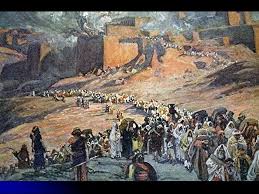
Notes by Lambert Dolphin

Email is welcome
Lambert Dolphin's Place
Recent and Recovered Articles
Newsletters Old and New
| The Temple Mount in Jerusalem: (http://templemount.org)
For more information on the Temple Mount in Jerusalem, research concerning the location of the First and Second Temples and recent developments there see our separate web site. Maps and history of Jerusalem are brought up to date with MP3 lectures by leading scholars and research papers concerning the location of the Jewish Temples and plans for a Third Temple. Developed with the help of Mike Kollen, Jim Milligan and Norma Robertson. |
 |

November 28, 2021
December 13, 2021
July 12, 2023.